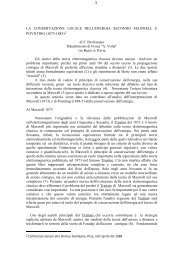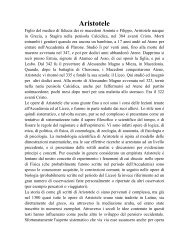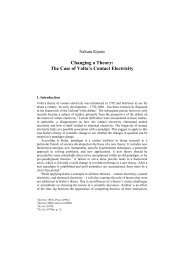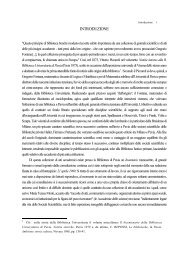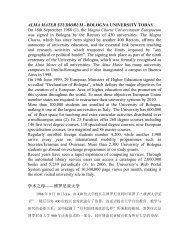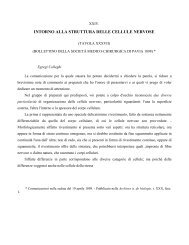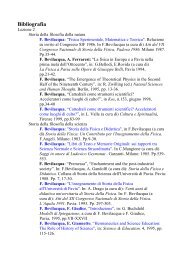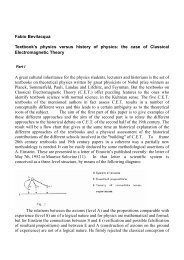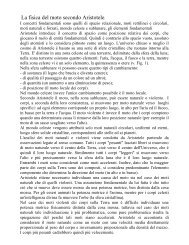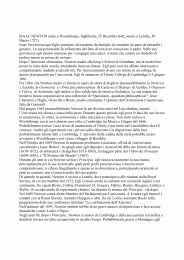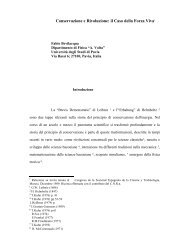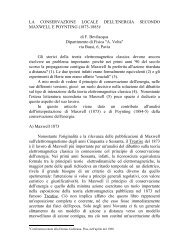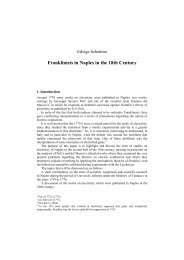Conservation and Innovation : Helmholtz's Struggle with Energy ...
Conservation and Innovation : Helmholtz's Struggle with Energy ...
Conservation and Innovation : Helmholtz's Struggle with Energy ...
You also want an ePaper? Increase the reach of your titles
YUMPU automatically turns print PDFs into web optimized ePapers that Google loves.
while the electromagnetic <strong>and</strong> the statistical approach, both deeply connected<br />
<strong>with</strong> energy problems, were actively pursued. Since energy conservation became<br />
one of the basic chapters of physics, the champions of the different research<br />
programs dedicated a great deal of logical <strong>and</strong> historical analysis to an<br />
underst<strong>and</strong>ing <strong>and</strong> framing of the various contributions <strong>and</strong> developments.<br />
Helmholtz was a leader in this spread of theoretical physics in the second half of<br />
the century, <strong>and</strong> is interesting to find out what was the judgement of his fellow<br />
scientists on his approach to PCE.<br />
I have already dealt <strong>with</strong> the first debate on the history <strong>and</strong> role of the<br />
energy pioneers, but besides Tyndall (1863) <strong>and</strong> Tait (1868 <strong>and</strong> 1876), from the<br />
seventies a number of books appeared on the history <strong>and</strong> foundations of energy<br />
theory which, while demonstrating the now recognized importance of the subject,<br />
gave interesting assessments of <strong>Helmholtz's</strong> contributions. Among them 409:<br />
Maxwell (1870 <strong>and</strong> 1877), B.Steward (1874), Stallo (1882), Lodge (1929), <strong>and</strong><br />
in Germany : Mach (1872, 1883 <strong>and</strong> 1896), Planck(1887), Helm (1887 <strong>and</strong><br />
1898), Ostwald (1903 (tr fr.1912) <strong>and</strong> 1908), Haas (1909), <strong>and</strong> in France :<br />
Duhem (1895,1905), Poincarè (1892 <strong>and</strong> 1902). Rowl<strong>and</strong> (1882) analysis of the<br />
experimental determinations of the mechanical equivalent of heat is also<br />
interesting.<br />
Philosophers too at the beginning of the century took a great interest in<br />
evaluating the role of <strong>Helmholtz's</strong> formulation of energy conservation, among<br />
these : Meyerson (1907) <strong>and</strong> Cassirer (1910). Important among the historians is<br />
the contribution of Mertz (1965 rep), that anticipates some modern<br />
historiographical claims.<br />
I will confine myself here at discussing some remarks on <strong>Helmholtz's</strong> energy<br />
theory <strong>and</strong> on his specific methods made by Planck, Helm <strong>and</strong> Poincarè.<br />
Planck outlines a basic problem in the formulation <strong>and</strong> application of the<br />
principle of conservation of energy, in whichever form : it is impossible to find<br />
the primary expression of the energy 410; the substantialization of energy is open to<br />
a certain degree of arbitrariness 411; there is a difficult theory/ experiment<br />
interplay 412. These general remarks are valid for all the expressions of the<br />
principle. What are the merits <strong>and</strong> demerits of <strong>Helmholtz's</strong> specific formulation?<br />
409 See n.7.<br />
410 Planck Prinzip p.114.<br />
411 Planck Prinzip p.104.<br />
412 Planck Prinzip Pp.45-47 e 235-40.



